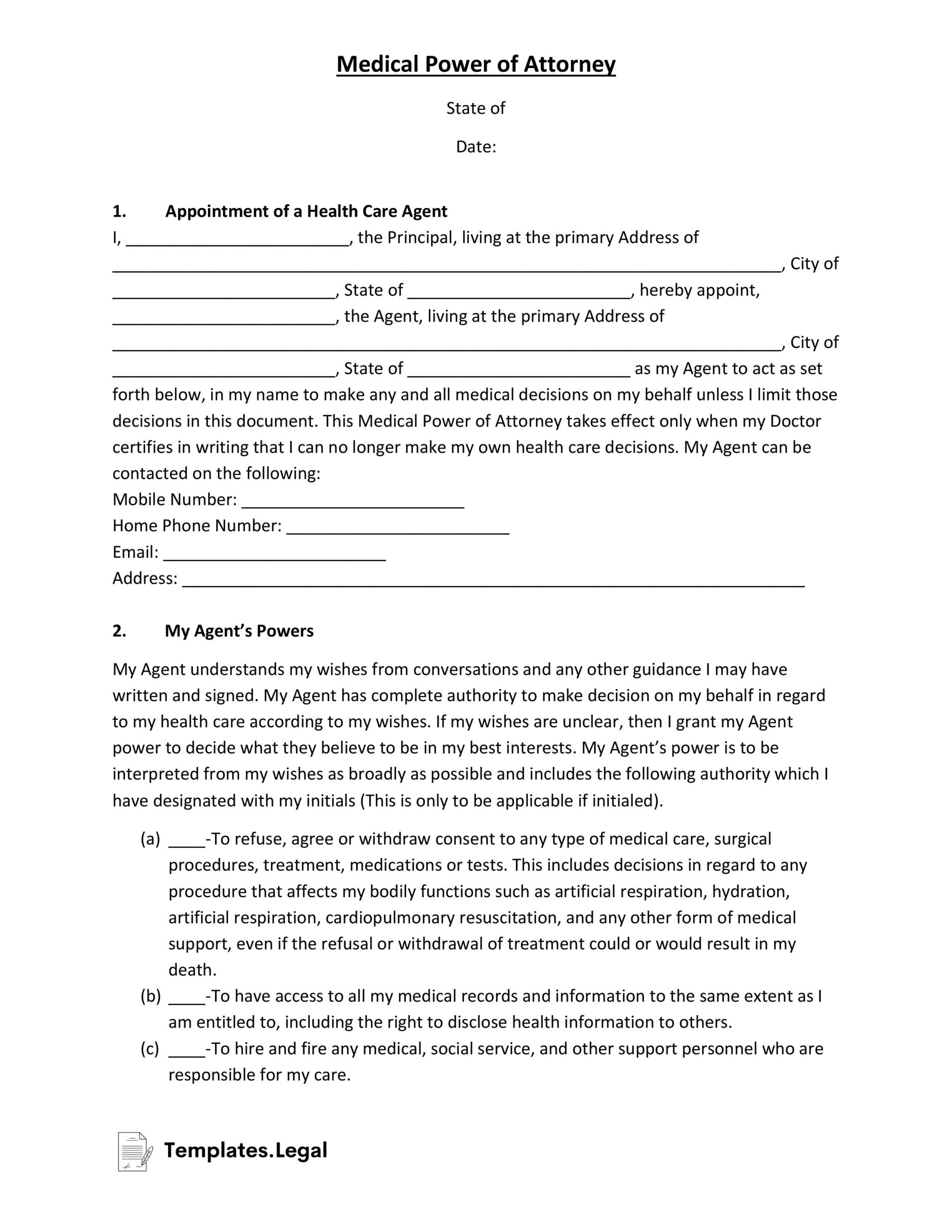Medical Power of Attorney Templates
A medical power of attorney may be one of the most important documents in your adult life. Even if you’re fit as a fiddle, it may be worth exploring your options to save you and your loved ones a lot of heartaches if there’s ever a crisis.
Medical Power of Attorney By State
What is a Medical Power of Attorney?
A power of attorney refers to legal documents that give somebody else the ability to make certain decisions on your behalf. A medical power of attorney allows somebody else to make determinations about your health and medical situations. There are several different types of powers of attorney to be mindful of:
- A non-durable power of attorney applies to set periods and specific transactions.
- A durable power of attorney allows somebody to step in and manage your affairs if you become incapacitated but don’t expire.
- Special or limited power of attorney covers a one-time event, usually a financial transaction. It applies only to the specific transaction, such as selling a piece of property.
- Springing power of attorney only applies if a specific event occurs to trigger its use.
Depending on where you live, “medical power of attorney” could be an advance directive, health power of attorney, or something similar. In all cases, the medical power of attorney provides your agent with access to your health records and authorizes them to make medical decisions when your physician says you cannot.
How to Get a Medical Power of Attorney
You have to be “of sound mind” when you complete and sign a medical power of attorney document. Since you never know when you could be in an accident that renders you incapacitated, it’s a good idea to secure a medical power of attorney sooner rather than later.
Thankfully, getting a medical power of attorney isn’t a complicated process. Still, handling it long before an incident arises could save you a lot of trouble down the line.
- Get the Proper Forms
You can download a medical power of attorney form and guide book for free. However, if you feel more comfortable getting help, reach out to a lawyer to walk you through the process.
It’s important to note that some states, like New Hampshire, Ohio, and Wisconsin, have additional requirements if you choose to use the national power of attorney form. You can still download a free medical power of attorney document, but make sure you get the correct one for your state. - Choose Your Representative
Selecting your representative may be the most challenging part of the power of attorney process. You may want to have open conversations with the person or people you choose to tap as your agents to ensure they understand your wishes. It’s not an easy conversation to have, but it prevents confusion and uncertainty in the event of an accident.
Since you don’t know when a medical emergency could occur, you may want to establish more than one agent to ensure that medical professionals follow your wishes. However, if you assign multiple agents, there could be disagreements about decisions. - Complete the Forms
If you download a medical power of attorney template to handle yourself, it’s essential to follow the guide book and complete the entire form. You have several decisions to make about what your agent can and cannot do for you. Some of the most common decisions include:
● Which physicians, hospitals, and care centers to use
● What tests, treatments, and interventions to allow
● Weighing quality of life versus doing everything medically possible for you
● If and when to disconnect life support
As you can see, these decisions won’t be easy, and it may mean having some uncomfortable conversations. However, having those tough conversations can make things easier for everyone involved. - Sign the Forms
You will need to sign the form, and a power of attorney goes into effect immediately after it’s signed. Each state has unique guidelines for signing the power of attorney forms. Though most states require a notarized power of attorney form, you may also need a few witnesses present.
FAQs
Do you still have questions? It’s completely understandable. Hopefully, these questions and answers will help clear up any doubt and confusion.

